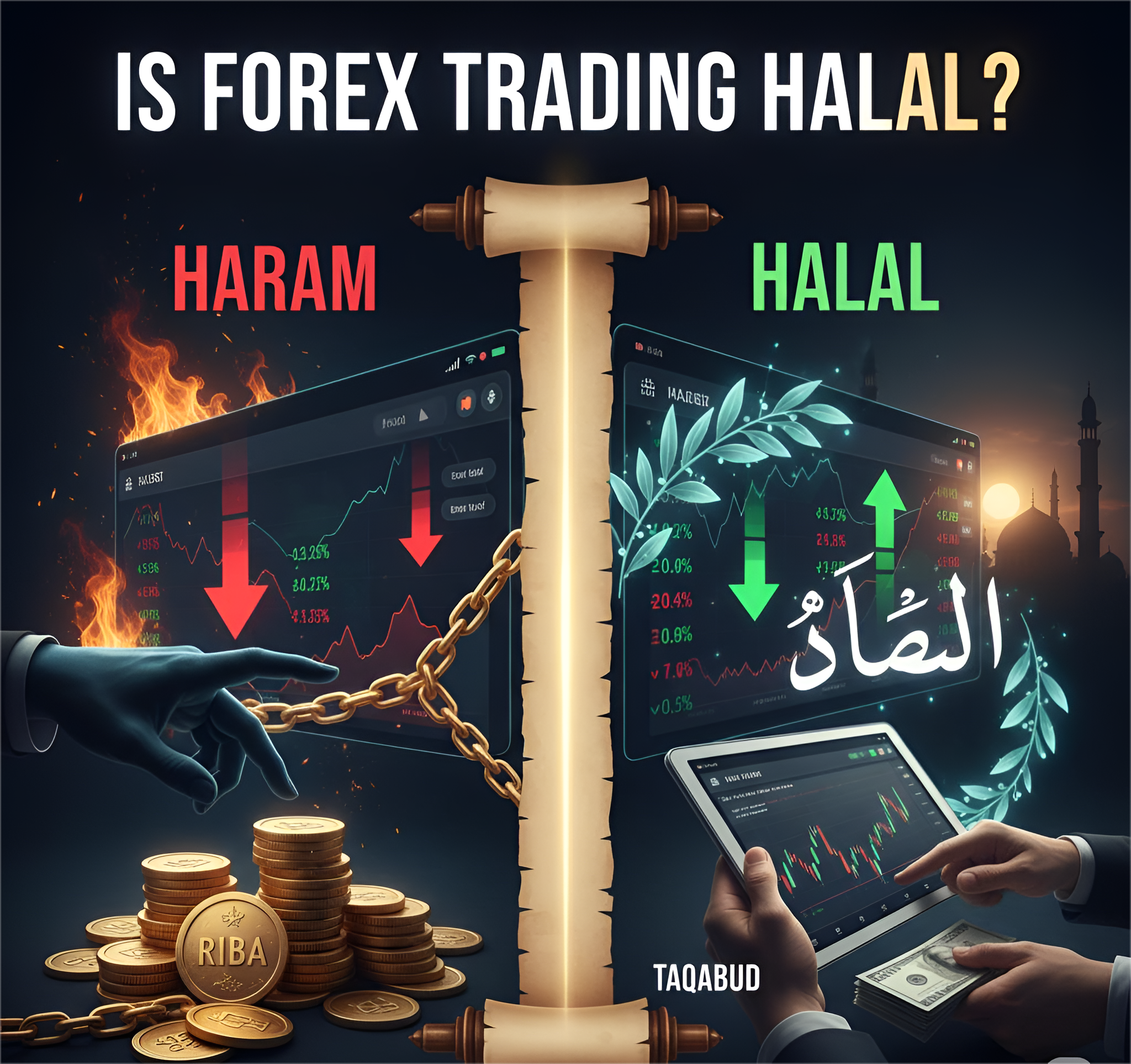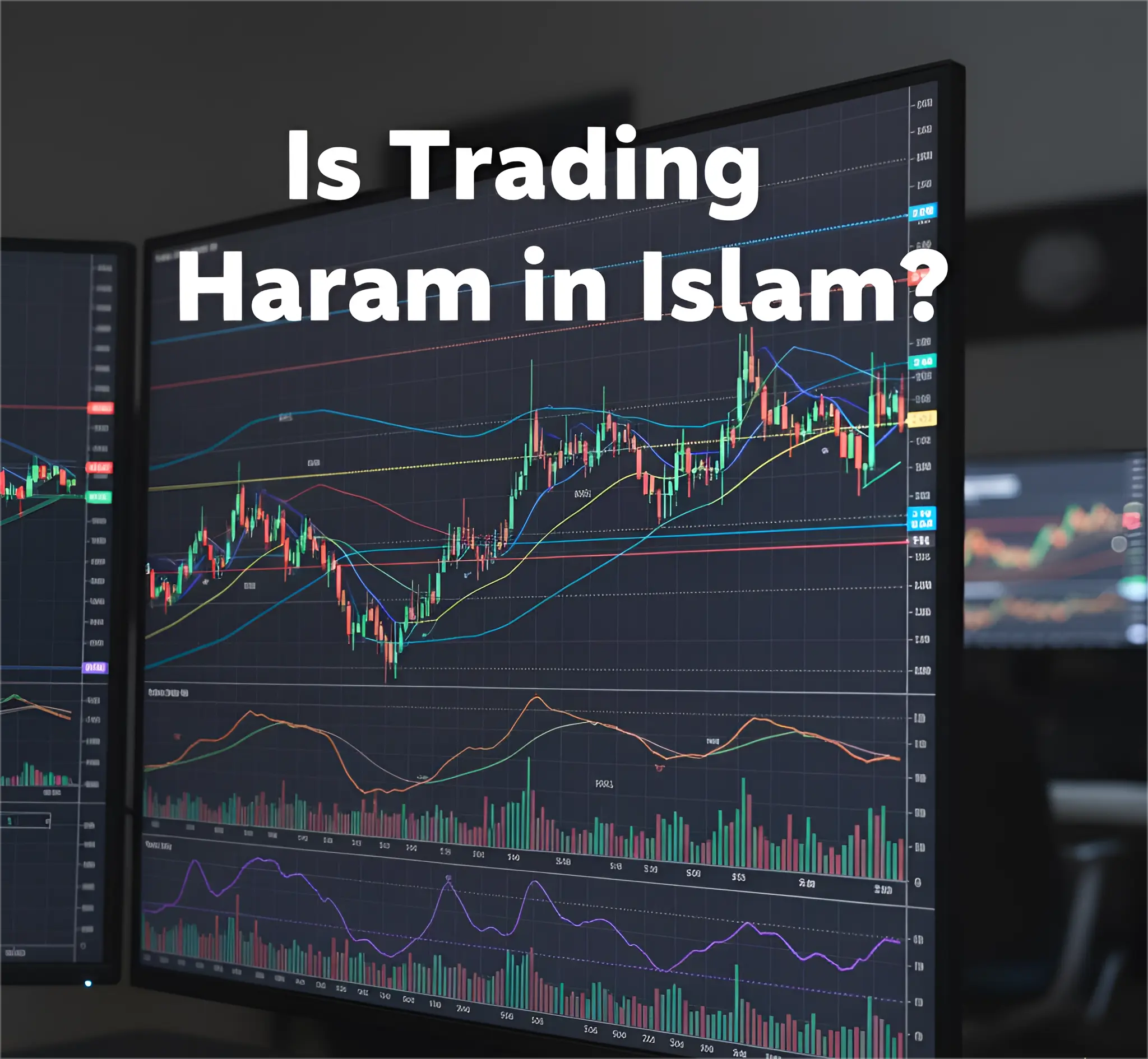Is Forex Trading Halal? A Guide for the Modern Muslim Investor

Is Forex Trading Halal? A Deep Dive into Islamic Finance and Modern Markets
The international foreign exchange (Forex or FX) market is the most liquid and largest financial market in the world, involving trillions of dollars daily. Its ease of access, liquidity, and the possibility of making substantial profit have drawn millions of traders, with an increasing number of them being from the Muslim world. This has raised a key question at the forefront of Islamic law (fiqh): Is Forex trading acceptable, or halal, according to Shariah law?
The response is not a straightforward yes or no. It is a complex matter that is dependent upon the fundamental tenets of Islamic finance and the particular mechanics of how the trade is being done. Although traditional Forex trading as done by most retail brokers has aspects that are absolutely forbidden (haram), a particular form of trade, done through what is an “Islamic Account,” has been designed to be compatible with Shariah principles.
This piece will give a detailed analysis of the arguments, unpacking the building blocks of prohibitions in Islamic finance, exploring how traditional Forex breaches them, and analyzing how Islamic accounts seek to offer an acceptable substitute.
The Foundations: Core Principles of Islamic Finance
To understand the Islamic perspective on Forex, one must first grasp the foundational principles that govern all financial transactions in Islam. Shariah aims to establish a just, equitable, and transparent economic system that promotes real economic activity and shared prosperity while prohibiting exploitation and excessive risk. Three primary prohibitions are central to this framework:
- Riba (Interest/Usury): This is perhaps the most well-known and stringent prohibition in Islamic finance. Riba is any set, certain excess or premium over a loan, independent of the rate. It is denounced in the Qur’an in the most emphatic terms (Al-Baqarah 2:275-279) because it makes a system in which money begets money without investing in any useful work or sharing the risk. It makes the lender gain without effort and responsibility, while the borrower is legally committed to pay even if his enterprise collapses.
- Gharar (Uncertainty or Ambiguity in Excess): Gharar means selling something uncertain, unknown, or not in hand. It means any contract where the specifications about the price, subject matter, or delivery are uncertain or left to depend on a future occurrence that is not certain. The ban on Gharar seeks to provide complete openness and avoid the possibility of disputes and exploitation due to vagueness in contracts. A example would be selling a fish while still in the sea or an unfed calf.
- Maysir (Gambling/Speculation): Maysir refers to the obtaining of wealth by chance or sheer speculation and not by bearing proportionate risk or by doing productive work. It is a zero-sum game wherein one person’s gain is simply derived from another person’s loss, without there being any newly created value. The ban on Maysir is designed to divert society from activities that depend on sheer luck and into those that require effort, expertise, and serve the genuine economy.
A fourth one, concerning currency exchange, is equally essential: the principle of Taqabud, or “hand-to-hand” exchange. Imposed on the basis of a well-known hadith of the Prophet Muhammad (peace be upon him), it stipulates that in the exchange of currencies (such as gold for gold, silver for silver), the exchange should be of equal value if the commodity is the same and should occur spot, with no delay in settlement. This principle guarantees that the transaction is an actual trade and not a speculative forward agreement that might have elements of Riba or Gharar.
An Analysis of Traditional Forex Trading from an Islamic Perspective
Applying these four principles to a typical retail Forex trading account, a number of key issues emerge that make it problematic in a Shariah context.
1. The Issue of Riba through Swap or Rollover Charges
This is the most obvious and serious offense. With Forex trading, the vast majority of positions left open over night (beyond the market’s closing hour, generally 5 PM EST) will incur a “swap” or “rollover” charge. This charge is an interest fee.
How it works: If a trader opens a position using leverage (e.g., buying EUR/USD), they are effectively borrowing one currency (USD) to purchase another (EUR). The broker pays or charges the trader interest on the difference of the two currencies’ interest rates. If the interest rate of the currency you purchased is greater than the one sold, you may earn a bit of interest. If lower, you pay interest.
This arrangement is a pure form of Riba. The trader is either paying or receiving an upfront interest fee in relation to the loan (leverage) received from the broker. This is an open contravention of Islamic law, and any profit gained from such an arrangement is illegal.
2. The Problem of Gharar and Maysir (Speculation vs. Investment)
The distinction between speculation and acceptable business risk (investment) may be thin, but it is an important one in Islamic finance. Investment entails assuming ownership of an asset and sharing in its productive potential, thus sharing in both its risk and its potential gain. Gambling, or Maysir, entails wagering on an event with no underlying productive endeavor.
It can be argued that a good deal of retail Forex trading lies nearer to Maysir than to investment. Traders are not generally making international trade easier or making investments in the long-term well-being of an economy. Rather, they are gambling on short-term price movement, keeping positions on for minutes or hours. The utilization of leveraged trading (e.g., 100:1 or 500:1) increases this speculative aspect. A speculator can leverage a $100,000 position with only $1,000 of his own money. This framework rewards high-risk, high-reward gambling rather than sound money management, closely replicating the dynamics of gambling.
3. The Problem of Taqabud (Hand-to-Hand Settlement)
The hadith specifies that currency transactions are to be settled on the spot. In the era of the computer, what is “on the spot”? When a retail trader places a trade, they are not actually being paid through a bank transfer of euros or yen. The trade exists as a contract for difference (CFD) on the broker’s platform. The settlement of the currency is actually not usually what is intended.This raises an academic issue.
- The Critical Approach: Other scholars hold that since the trader never actually receives delivery of the money and the deal is, for the most part, a speculation on the broker’s books, the stipulation of Taqabud is not satisfied. The contract is uncertain (Gharar) as it is not a genuine exchange of ownership.
- The Contemporary Interpretation: Increasingly, modern scholars contend that the real-time electronic settlement on a trading platform satisfies the essence of Taqabud. As soon as the trade is made, the ownership gets digitally and legally transferred in the trader’s account. The lag, if any, is minimal, comparable to the timing of handing over cash. This perspective takes the digital ledger as the contemporary analogue of a physical exchange.
4. Problem of Leverage as a Loan
The leverage provided by brokers is itself a loan. In a traditional account, this loan allows the charging of Riba (swap fees). Even absent swap fees, the nature of the loan itself can be objectionable. The broker advances this loan to enable a trade from which it benefits. Others interpret this as a conditional loan that confers an advantage on the lender (the broker), another type of hidden Riba.
The Proposed Solution: The “Islamic Forex Account”
In anticipation of the increasing needs of Muslim traders, most brokers introduced “Islamic Accounts,” or “Swap-Free Accounts.” These accounts are tailored to remove the aspects that are outright haram.
This is how they go about addressing the Shariah compliance concerns:
1. Removal of Riba: No Swaps
The most identifying characteristic of an Islamic account is the exclusion of all swap or rollover interest charges. A trader can keep a position open overnight, for days, or even weeks and pay zero interest-based charges. This addresses and answers the most critical breach of Islamic law in Forex trading.
But How Do Brokers Profit?
It’s a good and important question. If they aren’t earning interest, then how do they make money? An honest broker with a true Islamic account will replace the loss of swap profit with other Shariah-compliant methods:
- Broader Spreads: The spread is the gap between the bid (sell) and ask (buy) price of a currency pair. Brokers with Islamic accounts might provide slightly broader spreads on Islamic accounts. For instance, the EUR/USD spread could be 1.5 pips on an Islamic account as opposed to 1.2 pips on a standard account. This is a transparent, fixed cost of the transaction and is deemed a legitimate service charge (Ujrah), not interest.
- Commissions/Administration Fees: There are fixed commissions per lot traded or a simple administration fee to keep positions open for a long time (e.g., after 3 or 10 days). There is no calculation as a percentage of a loan, but it is a flat charge for maintaining the position open and the account management. As long as this fee is not tied to the amount “loaned” and is transparent and fixed, it is generally acceptable.
It is essential that traders examine such fee arrangements. If a broker’s “Islamic account” includes secret fees which vary as interest, it can be nothing more than a rebranded variant of Riba.
Avoiding Maysir and Gharar
Although an Islamic account can eliminate Riba, problems of Maysir (gambling) and Gharar (uncertainty) are more a matter of the trader’s intent (Niyyah) and plan. Scholars who allow trading under Islamic accounts do so with the following caveats:
- Informed Analysis: The trade must be driven by fundamental or technical analysis and not on whim or sheer guesswork. The trader must be using a skill and making an informed choice, which demarcates the activity from mere chance (Maysir).
- Real Economic Purpose: The trader must regard his activity as a currency management or investing activity, being a part of the global economy instead of merely playing a zero-sum game.
- No Deceptive Practices: The trader has to practice fair and transparent dealings, not indulging in market manipulation or other unfair means.
Fulfilling $Taqabud
As noted above, most contemporary scholars believe that the immediate execution and capture of a trade in an electronic account fulfill the requirement of “on the spot” settlement. The transaction between the broker (who serves as a counterparty) and the trader is finalized immediately, completing the substance of Taqabud.
Scholarly Opinions: A Spectrum of Views
It should be noted that there is no one, monolithic “fatwa” regarding Forex trading. Islamic scholars have views on a continuum.
- The Permissible View: A considerable number of modern-day fiqh councils and scholars believe that Forex trading can be halal if and only if it is done under a properly structured Islamic account. This involves the complete elimination of Riba (swaps), the immediate settlement of deals, and the intention to trade based on analysis and not gambling.
- The Cautious View: Others are cautious. They might allow it but urge traders to use the utmost caution. They fear that even without the use of swaps, the high leverage and market volatility drive the activity to the brink of gambling (Maysir). They recommend trading with little or no leverage.
- The Prohibitive View: A more rigorous minority of researchers hold the view that the whole retail Forex market is essentially speculative and divorced from the actual economy. They contend that it is a zero-sum activity that generates no real value and hence is impermissible, no matter what account structure is used.
Practical Checklist for a Muslim Trader
For a Muslim who wants to venture into the Forex market, the journey towards Shariah acceptance is a matter of diligent effort and staying true to principle. Here are practical steps:
- Acquire Knowledge: Prior to investing any capital, learn the fundamentals of Islamic finance (Riba, Gharar, Maysir) in-depth.
- Select a Reliable Broker: Pick a broker which has a properly Shariah-compliant Islamic account offering. Don’t settle for a “swap-free” tag. Review their terms and conditions to see how they charge fees. Ensure there are no esoteric interest-based fees hidden in there.
- Ensure the Account Structure: Ensure that the account charges wider spreads or a fixed fee rather than swaps. Be cautious of accounts that restrict how long you can remain in a position swap-free.
- Trade with Intention (Niyyah): Your intention should be to perform a skillful financial action based on analysis, not gamble to make instant wealth.
- Use Leverage Carefully: Don’t use too much leverage. High leverage is the most important device that makes trading a gamble. Lower leverage (say, 5:1 or 10:1) encourages more careful risk management.
- Talk to a Trustworthy Scholar: The most important step. Explain your particular case, the broker you’ve selected, and their account conditions to an experienced Islamic scholar you can trust. His advice is worth its weight in gold when dealing with this convoluted contemporary dilemma.
Conclusion
We cannot say categorically if Forex trading is halal or not. Standard Forex trading, including interest-bearing swap commissions, is categorically haram.
There is, though, a way through. With the application of carefully designed Islamic accounts which remove Riba, facilitate same-day settlement, and are applied by traders who enter the market with an analytical investment mindset in place of speculative gambling, Forex trading can be aligned with Islamic finance principles.
Ultimately, the burden rests with the individual Muslim to inform himself, cleanse himself of ulterior motives, make sound selections in tools, and seek counsel. At the intricate nexus of finance and religion, knowledge and righteousness are the sole reliable guides.
For more like this visit: Hilalinfohub


Post Comment